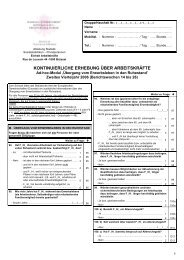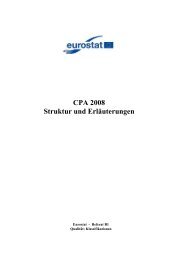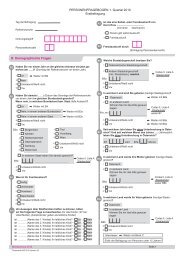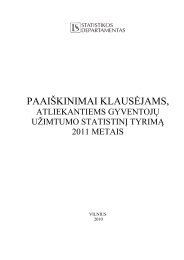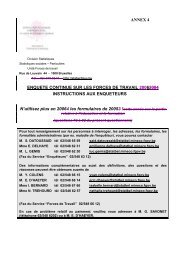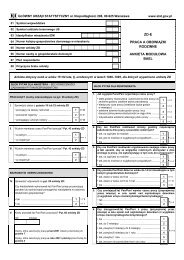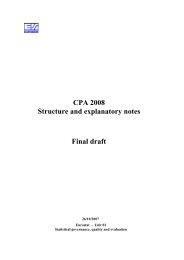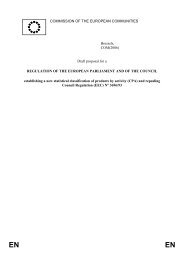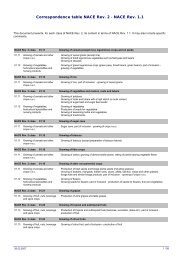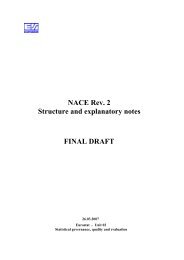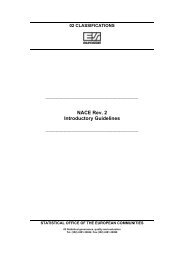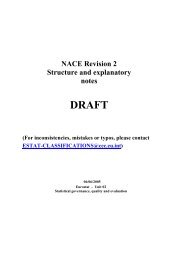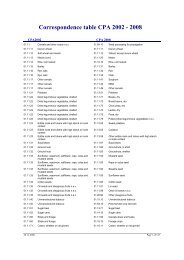Data capturing at the source - CIRCA - Europa
Data capturing at the source - CIRCA - Europa
Data capturing at the source - CIRCA - Europa
Create successful ePaper yourself
Turn your PDF publications into a flip-book with our unique Google optimized e-Paper software.
European Forum of Official Gazettes<br />
4th meeting<br />
Helsinki - Tallinn,<br />
14 th – 15 th June 2007<br />
<strong>D<strong>at</strong>a</strong> <strong>capturing</strong> <strong>at</strong> <strong>the</strong> <strong>source</strong><br />
Final Report of <strong>the</strong> Working Group<br />
presented by<br />
Alan Pawsey<br />
Head of Publishing Services<br />
Her Majesty’s St<strong>at</strong>ionery Office<br />
Office of Public Sector Inform<strong>at</strong>ion, United Kingdom
1. Introduction<br />
1.1 This paper sets out <strong>the</strong> final report from <strong>the</strong> Working Group on <strong>D<strong>at</strong>a</strong> Capture<br />
<strong>at</strong> <strong>the</strong> Source, <strong>the</strong> form<strong>at</strong>ion of which was agreed <strong>at</strong> <strong>the</strong> 2005 meeting of <strong>the</strong><br />
Forum in Copenhagen.<br />
2. Terms of Reference and Membership of <strong>the</strong> Working Group<br />
2.1 Following agreement to <strong>the</strong> form<strong>at</strong>ion of <strong>the</strong> Working Group, detailed terms of<br />
reference were subsequently proposed to <strong>the</strong> Extended Chair of <strong>the</strong> Forum and<br />
were agreed as follows:<br />
‘To consider <strong>the</strong> experience of Member St<strong>at</strong>es in developing systems for<br />
<strong>capturing</strong> legisl<strong>at</strong>ive d<strong>at</strong>a (both Primary and Secondary) <strong>at</strong> <strong>source</strong> and <strong>the</strong> use<br />
made of <strong>the</strong>se texts through <strong>the</strong> various stages to public<strong>at</strong>ion; to identify <strong>the</strong><br />
key requirements for such systems and wh<strong>at</strong> is necessary to ensure th<strong>at</strong> <strong>the</strong>se<br />
are implemented and accepted by those who need to use <strong>the</strong>m as part of <strong>the</strong><br />
legisl<strong>at</strong>ive processes.’<br />
2.2 The following individuals <strong>at</strong>tended meetings of <strong>the</strong> Working Group:<br />
Chair: Mr Alan Pawsey (United Kingdom)<br />
Secretary: Mr Roberto Pappalardo (Public<strong>at</strong>ions Office)<br />
Members Ms Marika Seppius (Estonia)<br />
Ms Külli Friedemann (Estonia)<br />
Mr Jean-Marc Helbecque (France)<br />
Mr Dick Caffrey (Ireland)<br />
Mr Ints Kalnins (L<strong>at</strong>via)<br />
Mr Aigars Berzins (L<strong>at</strong>via)<br />
Mr Artis Trops (L<strong>at</strong>via)<br />
Ms Ausra Bodin(Lithuania)<br />
Mr Andon Stefanovski (Macedonia)<br />
Ms Snezana Kuzmanovska (Macedonia)<br />
Mr Alois Balmer (Switzerland)<br />
Mr Pedro Ferreira (Portugal)<br />
Mr Andrej Budkovic (Slovenia)<br />
Ms Eleni Keou (Greece)<br />
Mr Phil Halls (United Kingdom)<br />
Mr John Sheridan (United Kingdom)<br />
Ms Lesley Torun (United Kingdom)<br />
Mr Albrecht Berger, Mr Yves Steinitz, Ms P<strong>at</strong>ricia Oprea, Ms Marie Lambert<br />
and Mr Pascal Gruber from <strong>the</strong> Office of Public<strong>at</strong>ions of <strong>the</strong> European<br />
Communities also <strong>at</strong>tended a meeting of <strong>the</strong> Working Group.
3. Meetings<br />
3.1 Five meetings of <strong>the</strong> Working Group have taken place:<br />
5 May 2006 in London;<br />
7 July 2006 in Brussels;<br />
9 November 2006 in Brussels;<br />
20 February 2007 in Zurich; and<br />
11 May 2007 in London<br />
details of which can be found on <strong>the</strong> Forum website <strong>at</strong>:<br />
http://forum.europa.eu.int/Members/irc/opoce/ojf/info/d<strong>at</strong>a/prod/html_rest/proj<br />
ect_1.htm<br />
3.2 Unfortun<strong>at</strong>ely not all members of <strong>the</strong> Group were able to <strong>at</strong>tend all of <strong>the</strong><br />
meetings.<br />
3.3 During its meetings <strong>the</strong> Group considered <strong>the</strong> responses received in rel<strong>at</strong>ion to<br />
<strong>the</strong> questionnaire which had been sent out to <strong>the</strong> Members of <strong>the</strong> Forum, and<br />
also received present<strong>at</strong>ions of <strong>the</strong> various systems in use within France,<br />
Greece, <strong>the</strong> United Kingdom, L<strong>at</strong>via, Macedonia and Switzerland for <strong>the</strong><br />
drafting of Primary and Deleg<strong>at</strong>ed legisl<strong>at</strong>ion and how <strong>the</strong>se worked in<br />
rel<strong>at</strong>ion to <strong>the</strong> subsequent public<strong>at</strong>ion of <strong>the</strong> legisl<strong>at</strong>ion both in print and on <strong>the</strong><br />
internet. The Working Group also reviewed a present<strong>at</strong>ion which <strong>the</strong> Austrian<br />
deleg<strong>at</strong>ion had presented to <strong>the</strong> EU Working Party on Legal <strong>D<strong>at</strong>a</strong> Processing.<br />
3.4 The Group considered how <strong>the</strong> various systems oper<strong>at</strong>ed within Member<br />
St<strong>at</strong>es, how much of <strong>the</strong> process from drafting to public<strong>at</strong>ion in <strong>the</strong> Gazette,<br />
<strong>the</strong>y covered; and how <strong>the</strong>y had been developed and implemented.<br />
4. Questionnaire to <strong>the</strong> Members of <strong>the</strong> Forum<br />
4.1 Before <strong>the</strong> first meeting of <strong>the</strong> Group, a questionnaire was issued to all<br />
members of <strong>the</strong> Forum inviting <strong>the</strong>m to provide some inform<strong>at</strong>ion about:<br />
a. <strong>the</strong> systems currently in use;<br />
b. whe<strong>the</strong>r <strong>the</strong> systems are based on use of standard software packages<br />
(e.g. Microsoft Word) or have been developed specially for use for <strong>the</strong><br />
task of preparing legisl<strong>at</strong>ion;<br />
c. who was involved in development/implement<strong>at</strong>ion of <strong>the</strong> systems;<br />
d. do <strong>the</strong> outputs from <strong>the</strong> drafting systems drive <strong>the</strong> print and public<strong>at</strong>ion<br />
systems, or are <strong>the</strong>re separ<strong>at</strong>e typesetting or o<strong>the</strong>r systems in use;<br />
e. are <strong>the</strong> systems based on use of XML standards or are <strong>the</strong> outputs from<br />
<strong>the</strong> systems subject to l<strong>at</strong>er conversion to XML; and<br />
f. who uses <strong>the</strong> systems (i.e. Lawyers, Ministries and/or <strong>the</strong> Official<br />
Gazette)?<br />
4.2 Unfortun<strong>at</strong>ely <strong>the</strong> replies to <strong>the</strong> questionnaire were slow in coming in and we<br />
sent out three fur<strong>the</strong>r requests to those countries which had not replied. Even<br />
so replies from 8 countries were not received by <strong>the</strong> time this report was<br />
finalised.
4.3 Details of <strong>the</strong> replies which were received up to <strong>the</strong> d<strong>at</strong>e of compiling this<br />
report are summarised in Annex A.<br />
4.4 The replies which we have received reveal a mixed range of systems in use<br />
including those:<br />
• which have no link between <strong>the</strong> drafting and public<strong>at</strong>ion phases;<br />
• which have fully integr<strong>at</strong>ed systems based on use of templ<strong>at</strong>ed drafting<br />
systems which gener<strong>at</strong>e <strong>the</strong> outputs for both printing and public<strong>at</strong>ion on<br />
<strong>the</strong> internet;<br />
• which do not make any use of XML;<br />
• where <strong>the</strong> drafting and printing/publishing is rel<strong>at</strong>ed very closely to an<br />
XML schema;<br />
• which involve use of standard software packages (e.g. Microsoft Word and<br />
Excel; Adobe Acrob<strong>at</strong>, InDesign and Framemaker) with or without use of<br />
templ<strong>at</strong>es; through to those which have involved <strong>the</strong> development of<br />
bespoke software.<br />
5. The Legisl<strong>at</strong>ive and public<strong>at</strong>ion processes<br />
5.1 The legisl<strong>at</strong>ive processes in place within each Member St<strong>at</strong>e are generally very<br />
similar whe<strong>the</strong>r <strong>the</strong>se cover Primary legisl<strong>at</strong>ion (Acts) or Deleg<strong>at</strong>ed legisl<strong>at</strong>ion<br />
(Regul<strong>at</strong>ions). The systems in use will often be very different depending upon<br />
whe<strong>the</strong>r <strong>the</strong>y have been developed to cover <strong>the</strong> entire process from initial<br />
drafting, through any parliamentary or o<strong>the</strong>r legisl<strong>at</strong>ive process, to final<br />
public<strong>at</strong>ion in <strong>the</strong> Official Gazette and possibly any subsequent consolid<strong>at</strong>ion<br />
process.<br />
5.2 The entire process will commence with <strong>the</strong> initial drafting stage which will<br />
begin with <strong>the</strong> instructions to draftsmen who will generally be lawyers or o<strong>the</strong>r<br />
specialists engaged specifically for <strong>the</strong> task of drafting legisl<strong>at</strong>ion. In <strong>the</strong> case<br />
of <strong>the</strong> primary legisl<strong>at</strong>ion process <strong>the</strong> resulting output from <strong>the</strong> initial drafting<br />
process will <strong>the</strong>n form <strong>the</strong> basis for consider<strong>at</strong>ion by Parliament where <strong>the</strong><br />
draft may be substantially amended prior to <strong>the</strong> final Act text being agreed.<br />
5.3 Once agreed <strong>the</strong> public<strong>at</strong>ion stage may require <strong>the</strong> output to be delivered in a<br />
form from which printed, online PDF, X/HTML and o<strong>the</strong>r electronic products<br />
can be produced.<br />
5.4 Where detailed workflow systems have been developed <strong>the</strong>y tend to cover <strong>the</strong><br />
same ground as evidenced by <strong>the</strong> following diagrams which represent <strong>the</strong><br />
workflow systems in use in <strong>the</strong> Austrian province Styria for <strong>the</strong> drafting and<br />
production of primary legisl<strong>at</strong>ion; and in <strong>the</strong> United Kingdom for <strong>the</strong> drafting,<br />
production and public<strong>at</strong>ion of deleg<strong>at</strong>ed legisl<strong>at</strong>ion:
Steps of legisl<strong>at</strong>ion<br />
draft/bill<br />
Autor<br />
Author<br />
<strong>the</strong> SI<br />
decision<br />
public<strong>at</strong>ion<br />
document<strong>at</strong>ion<br />
and inform<strong>at</strong>ion<br />
UK Deleg<strong>at</strong>ed Legisl<strong>at</strong>ion (SI templ<strong>at</strong>e process)<br />
Ministry/<br />
Department<br />
Valid<strong>at</strong>e<br />
and<br />
Minister<br />
signs<br />
HMSO<br />
Publishing<br />
contractor<br />
Register Production<br />
W W W W XML<br />
Print<br />
PDF<br />
XML<br />
HTML<br />
5.5 In many countries <strong>the</strong> coverage of systems will be different, with separ<strong>at</strong>e<br />
systems being used in <strong>the</strong> drafting and parliamentary processes and <strong>the</strong><br />
Official Gazette receiving text ei<strong>the</strong>r in hard copy or a range of different<br />
electronic form<strong>at</strong>s from which it <strong>the</strong>n origin<strong>at</strong>es its own electronic versions for<br />
public<strong>at</strong>ion in print and on <strong>the</strong> internet. The following diagram shows where<br />
<strong>the</strong> current systems used by <strong>the</strong> Official Gazettes start in <strong>the</strong> overall legisl<strong>at</strong>ive<br />
process.
1. Level<br />
Parliament<br />
2. Level<br />
Ministries<br />
Intern<strong>at</strong>ional<br />
Tre<strong>at</strong>ies<br />
Example<br />
starting point<br />
for N<strong>at</strong>ional<br />
systems<br />
Political<br />
Process<br />
Constitution<br />
Laws<br />
1. Lev. Regul<strong>at</strong>ion<br />
2. Lev. Regul<strong>at</strong>ion<br />
3. Lev. Regul<strong>at</strong>ion<br />
Content<br />
Applic<strong>at</strong>ion rules<br />
Austria<br />
UK<br />
Switzerland<br />
Decision<br />
Public<strong>at</strong>ion<br />
Process<br />
Albania<br />
Greece<br />
6. The benefits of <strong>capturing</strong> d<strong>at</strong>a <strong>at</strong> <strong>source</strong><br />
1. Public<strong>at</strong>ion: Journal<br />
Consolid<strong>at</strong>ion<br />
Process<br />
6.1 There are clear benefits of <strong>capturing</strong> d<strong>at</strong>a in a structured form<strong>at</strong> as early in <strong>the</strong><br />
process as possible. These include:<br />
• a simplific<strong>at</strong>ion of <strong>the</strong> publishing process by helping draftsmen to<br />
produce a document th<strong>at</strong> resembles a final piece of legisl<strong>at</strong>ion;<br />
• a reduction in errors in content and layout <strong>at</strong> public<strong>at</strong>ion;<br />
• production of documents which are consistently styled no m<strong>at</strong>ter<br />
where and by whom <strong>the</strong>y are origin<strong>at</strong>ed;<br />
• <strong>the</strong> ability to introduce valid<strong>at</strong>ion of d<strong>at</strong>a <strong>at</strong> an early stage;<br />
• elimin<strong>at</strong>ing <strong>the</strong> need for re-keying or conversion of d<strong>at</strong>a enabling<br />
speedier production; and<br />
• it is more cost efficient for both <strong>the</strong> Ministries/Parliament and <strong>the</strong><br />
publisher of <strong>the</strong> Official Gazette.<br />
7. Key requirements for <strong>capturing</strong> d<strong>at</strong>a <strong>at</strong> <strong>source</strong><br />
7.1 Any systems which are designed to cover <strong>the</strong> entire legisl<strong>at</strong>ive process from<br />
drafting through to public<strong>at</strong>ion must support a range of activities especially<br />
during <strong>the</strong> act of political decision making. This can happen in several stages<br />
and involve different groups of personnel. They will work on <strong>the</strong> texts:<br />
cre<strong>at</strong>ion, drafting, redrafting, deletion, amending and contacting o<strong>the</strong>r groups<br />
etc. It may involve many people working on <strong>the</strong> texts who have different<br />
levels of knowledge and experience and who are working to achieve different<br />
goals.<br />
7.2 The n<strong>at</strong>ure of any systems to be implemented will also depend upon <strong>the</strong> place<br />
and influence of <strong>the</strong> Official Gazette in <strong>the</strong> overall legisl<strong>at</strong>ive process. The<br />
following requirements which <strong>the</strong> Working Group has identified as being<br />
2. Consolid<strong>at</strong>ed Form
important in any system which are desirable for <strong>the</strong> successful implement<strong>at</strong>ion<br />
of systems covering <strong>the</strong> entire process from drafting through to public<strong>at</strong>ion:<br />
7.2.1 Techniques th<strong>at</strong> are easy to understand and learn<br />
Any system has to be capable of being used by a wide range of people<br />
who have different objectives to achieve and will have different levels<br />
of knowledge and experience and who may be infrequent users of <strong>the</strong><br />
system. It is essential <strong>the</strong>refore th<strong>at</strong> it is easy for everybody to<br />
understand and learn and must not be devised solely for experts who<br />
will use <strong>the</strong> system on a regular basis.<br />
It is also essential th<strong>at</strong> in specifying <strong>the</strong> system th<strong>at</strong> all potential groups<br />
of users are involved in <strong>the</strong> process involved as <strong>the</strong> system is<br />
developed. This will ease <strong>the</strong> task of implement<strong>at</strong>ion and increase <strong>the</strong><br />
chances of widespread acceptance of <strong>the</strong> system across <strong>the</strong> entire user<br />
community.<br />
7.2.2 Text manipul<strong>at</strong>ion software th<strong>at</strong> is easy to use<br />
Just as it is important for any system to be easily understood any text<br />
manipul<strong>at</strong>ion software should be easy to use. Many successful systems<br />
which are currently in use make full use of standard software packages<br />
(e.g. Microsoft Word) which most users use in <strong>the</strong>ir day to day work. If<br />
<strong>the</strong>y become involved in <strong>the</strong> legisl<strong>at</strong>ive process it is <strong>the</strong>refore easy for<br />
<strong>the</strong>m to understand systems which are based closely on wh<strong>at</strong> <strong>the</strong>y use<br />
already. From a cost and systems support point of view it also means<br />
th<strong>at</strong> generally <strong>the</strong>re are fewer software packages which have to be<br />
installed and maintained and <strong>the</strong> cost of implement<strong>at</strong>ion will be<br />
reduced.<br />
7.2.3 Editors who can produce simple and difficult texts reliably in content<br />
and layout and which can be valid<strong>at</strong>ed autom<strong>at</strong>ically.<br />
Ideally any system should enable users to produce both simple and<br />
difficult texts which can be produced reliably each time and which <strong>the</strong><br />
user can see to be correct. This can be achieved by using standard<br />
templ<strong>at</strong>es which have been designed for handling <strong>the</strong> particular text<br />
elements and which also allow for wysiwyg present<strong>at</strong>ion of <strong>the</strong> draft<br />
as it will appear when published in <strong>the</strong> Official Gazettes.<br />
7.2.4 It must allow both simple and complic<strong>at</strong>ed text with <strong>the</strong> same<br />
instruments to be worked upon (text, tables, graphics, pictures etc)<br />
Although most legisl<strong>at</strong>ion will be based on <strong>the</strong> use of text it is not<br />
unusual for complex formulae, tables, graphics and pictures to be<br />
incorpor<strong>at</strong>ed into <strong>the</strong> drafts. This again necessit<strong>at</strong>es <strong>the</strong> use of systems<br />
which are based on use of software which incorpor<strong>at</strong>e particular tools<br />
(e.g. Equ<strong>at</strong>ion Editor within Microsoft Word) or can readily<br />
incorpor<strong>at</strong>e images and pictures (e.g. in tif and o<strong>the</strong>r form<strong>at</strong>s), and<br />
spreadsheets produced in comp<strong>at</strong>ible systems (e.g. Microsoft Excel).
Again, where o<strong>the</strong>r d<strong>at</strong>a elements are being incorpor<strong>at</strong>ed into <strong>the</strong> texts<br />
it is helpful for <strong>the</strong> user to be able to view a wysiwyg present<strong>at</strong>ion of<br />
<strong>the</strong> draft as it will appear when published in <strong>the</strong> Official Gazettes.<br />
7.2.5 A general, well known d<strong>at</strong>a form<strong>at</strong> (e.g. Microsoft Word), th<strong>at</strong> should<br />
be used in text process-systems by Parliament, Government officials<br />
and anybody who is to be consulted on <strong>the</strong> draft legisl<strong>at</strong>ion.<br />
As for ensuring th<strong>at</strong> any text manipul<strong>at</strong>ion software is easy to use it is<br />
also sensible to have systems based which use well known d<strong>at</strong>a form<strong>at</strong>s<br />
which allows for <strong>the</strong> exchange of drafts with those who may not be<br />
directly involved in <strong>the</strong> legisl<strong>at</strong>ive process but may never<strong>the</strong>less need<br />
to see and comment on drafts. Use of form<strong>at</strong>s which may be in<br />
everyday use thus aids this process.<br />
7.2.6 The method of oper<strong>at</strong>ion and instruments to be used should be widely<br />
available ensuring th<strong>at</strong> all people involved in <strong>the</strong> process can work<br />
with <strong>the</strong> same working technique and <strong>the</strong> same instruments.<br />
7.2.7 It must bring <strong>the</strong> same results both online and offline<br />
It must support structural elements within which <strong>the</strong> working<br />
documents can be turned into public<strong>at</strong>ions autom<strong>at</strong>ically (e.g.<br />
autom<strong>at</strong>ic conversion into XML)<br />
The benefits of holding legisl<strong>at</strong>ive texts in XML form<strong>at</strong>s has already<br />
been well documented in <strong>the</strong> report from <strong>the</strong> Working Group on <strong>the</strong><br />
Use of XML for <strong>the</strong> production and distribution of <strong>the</strong> official gazettes<br />
which delivered its final report <strong>at</strong> <strong>the</strong> Ljubljana meeting. Any system<br />
which is implemented should enable legisl<strong>at</strong>ive texts to be converted<br />
autom<strong>at</strong>ically to XML. This will mean th<strong>at</strong> <strong>the</strong> d<strong>at</strong>a which is captured<br />
<strong>at</strong> <strong>the</strong> <strong>source</strong> should be form<strong>at</strong>ted taking account of <strong>the</strong> XML Schema.<br />
The benefits of this are illustr<strong>at</strong>ed in <strong>the</strong> Workflow diagram for United<br />
Kingdom legisl<strong>at</strong>ion below, which shows <strong>the</strong> various feeds for both<br />
primary and deleg<strong>at</strong>ed legisl<strong>at</strong>ion into a Content Management System<br />
based on <strong>the</strong> XML Schema and from which outputs are gener<strong>at</strong>ed for<br />
print production and in PDF, XML and X//HTML for publishing on<br />
<strong>the</strong> internet and for supply to Priv<strong>at</strong>e Sector Law Publishers who utilise<br />
<strong>the</strong> XML d<strong>at</strong>a in <strong>the</strong>ir online d<strong>at</strong>abases.
SIs (SGML)<br />
SGML<br />
SI templ<strong>at</strong>e (W ord)<br />
W<br />
Acts (SGML, W ord)<br />
W<br />
SGML<br />
The legisl<strong>at</strong>ion workflow<br />
CMS<br />
Legisl<strong>at</strong>ion<br />
Schema XML<br />
Print<br />
PDF<br />
XML<br />
HTML<br />
7.2.8 It must ensure <strong>the</strong> flow of work in two directions, without <strong>the</strong> loss of<br />
content and metad<strong>at</strong>a. particularly for graphics and tables (e.g.<br />
documents in XML back into doc)<br />
7.2.9 It may need to support more than one language so th<strong>at</strong> <strong>the</strong> integrity of<br />
multilingual text issues can be guaranteed (content, structure and<br />
meaning)<br />
7.2.10 It must be capable of delivering outputs which end users can be<br />
secure in knowledge are au<strong>the</strong>ntic reproductions of <strong>the</strong> laws which<br />
have been passed by Parliament or adopted by Ministers.<br />
The separ<strong>at</strong>e Working Group on Au<strong>the</strong>nticity is proposing appropri<strong>at</strong>e<br />
measures in <strong>the</strong>ir final report which is also due to be delivered <strong>at</strong> <strong>the</strong><br />
Helsinki/Tallinn meeting.<br />
7.2.11 It should enable full version control of <strong>the</strong> drafts.<br />
8. Conclusion<br />
8.1 The requirements for systems which are set out <strong>at</strong> in Section 6 above are seen<br />
to be a set of requirements for a complete system involving everything from<br />
initial drafting through to public<strong>at</strong>ion in <strong>the</strong> Official Gazette. Many of <strong>the</strong>se<br />
requirements may, however, not be required by all countries whose processes<br />
and <strong>the</strong> involvement of <strong>the</strong> Official Gazette are different.<br />
9. Thanks<br />
9.1 Can I express my thanks to <strong>the</strong> o<strong>the</strong>r members of <strong>the</strong> Working Group for <strong>the</strong>ir<br />
contributions and especially to Mr Alois Balmer of Switzerland and our<br />
Secretary, Roberto Pappalardo for <strong>the</strong>ir help and support.
Belgium The Belgian Official Journal There is no general drafting system N/A The OJ receives<br />
publishes (in <strong>the</strong> same copy of <strong>the</strong><br />
inform<strong>at</strong>ion in MS Office<br />
OJ) legisl<strong>at</strong>ion from different<br />
form<strong>at</strong>s (Word and excel),<br />
parliaments and governments. They<br />
HTML (as a Word<br />
all have <strong>the</strong>ir own internal system fro<br />
document output) and<br />
preparing <strong>the</strong>ir legisl<strong>at</strong>ion and for OJ<br />
PDF. Part of <strong>the</strong><br />
output<br />
inform<strong>at</strong>ion is delivered as<br />
paper copy. The OJ<br />
converts <strong>the</strong>se form<strong>at</strong>s into<br />
Xyvision layout files and<br />
exports <strong>the</strong>m as postscript<br />
and html. The postscript is<br />
<strong>the</strong>n converted into PDF<br />
for online publishing. The<br />
html files are used in <strong>the</strong><br />
underlying ‘full text<br />
search’ d<strong>at</strong>abase.<br />
Bosnia and System currently being developed System will be specially developed Official Gazette<br />
The system will be<br />
Herzegovina<br />
and based on d<strong>at</strong>a base<br />
Contractors<br />
integr<strong>at</strong>ed with layout<br />
software for paper prints<br />
and web design,<br />
Also used to gener<strong>at</strong>e<br />
XML, HTML, PDF<br />
versions (Corel Ventura<br />
and Adobe InDesign)<br />
Czech Republic eKLEP MS Office documents are input for Office of <strong>the</strong> Czech MS Office documents are<br />
eKLEP<br />
Republic Government just stored on <strong>the</strong> Web for<br />
fur<strong>the</strong>r use<br />
HTML and XML Central organs of <strong>the</strong> st<strong>at</strong>e<br />
administr<strong>at</strong>ion (i.e.<br />
Ministries)<br />
The system will not be<br />
based on XML schema,<br />
but we can convert to<br />
XML<br />
Official Gazette<br />
Government offices<br />
Output from “e-law” draft<br />
bill, government bill,<br />
Federal Law Gazette is<br />
published in <strong>the</strong> Austrian<br />
Legal Inform<strong>at</strong>ion System<br />
It could be th<strong>at</strong> some<br />
institutions use XML in<br />
<strong>the</strong>re own back offices<br />
but it is not used within<br />
<strong>the</strong> OJ<br />
Albania No specific systems – hard copy<br />
texts provided to Public<strong>at</strong>ions Office<br />
Austria Austrian legal Inform<strong>at</strong>ion System<br />
(www.ris.bka.gv.<strong>at</strong>) and “e-law”<br />
(Also use MS Word and Acrob<strong>at</strong>)<br />
systems<br />
standards<br />
MS Word N/A No <strong>D<strong>at</strong>a</strong> is converted to Official Public<strong>at</strong>ion Office<br />
XML<br />
The “e-law” system was developed Federal Chancellery,<br />
XML Austrian Federal Ministries<br />
specifically for use for <strong>the</strong> task of Federal Ministries,<br />
preparing legisl<strong>at</strong>ion.<br />
Parliament<br />
Country Systems currently in use N<strong>at</strong>ure of systems (software etc) Who involved in<br />
development/<br />
implement<strong>at</strong>ion<br />
Do <strong>the</strong> systems drive<br />
print and public<strong>at</strong>ion<br />
Are systems based on<br />
XML or o<strong>the</strong>r<br />
Who uses <strong>the</strong> systems<br />
Survey of Systems in use by Member St<strong>at</strong>es (Replies received as <strong>at</strong> 30 May 2007)<br />
Annex A
system to Parliament and to print.<br />
France The actual production is based on a<br />
main part of paper’s flow, and<br />
completed by using CD-ROM and<br />
emails for transferring electronic<br />
d<strong>at</strong>a. SOLON system, currently in a<br />
test phase, concerns <strong>the</strong><br />
reglement<strong>at</strong>ion, managed by<br />
ministries. The object of SOLON is<br />
mainly on <strong>the</strong> secondary legisl<strong>at</strong>ion (<strong>the</strong><br />
regul<strong>at</strong>ion) but also on <strong>the</strong> primary<br />
The d<strong>at</strong>a capture is done with<br />
Microsoft Word. The “driving open<br />
office” in version number 2 allows an<br />
XML transl<strong>at</strong>ion based on <strong>the</strong> use of<br />
The system’s basis is <strong>the</strong> SAP software<br />
but SOLON needs some specific<br />
functions done by parametris<strong>at</strong>ion and<br />
some extra developments to<br />
personalize <strong>the</strong> tool.<br />
This project is managed by<br />
<strong>the</strong> General Secretary of<br />
<strong>the</strong> Government,<br />
technically realised by SAP<br />
and hosted by a priv<strong>at</strong>e<br />
company <strong>at</strong> equipment<br />
level. The Official Journal<br />
is part of <strong>the</strong> technical team<br />
working on <strong>the</strong> project.<br />
SOLON is <strong>the</strong> front end of<br />
<strong>the</strong> Official Journal<br />
production.<br />
We are developing, with a<br />
sub-contractor, on a new<br />
system to print and publish<br />
our production : legisl<strong>at</strong>ion,<br />
reglement<strong>at</strong>ion, legal ads<br />
and public market ads.<br />
Our production tool<br />
will be full XML.<br />
publishing.<br />
The access is <strong>at</strong> ministries<br />
level (cabinet offices, St<strong>at</strong>e<br />
Council, Assemblies and<br />
Prime Minister Secretaries,<br />
(contributions) and finally<br />
<strong>the</strong> Official Journal<br />
(receptions). SOLON will be<br />
used by 500 people. It is<br />
really <strong>the</strong> administr<strong>at</strong>ive<br />
processing of texts<br />
Finland In <strong>the</strong> centralized Government<br />
Decision Making System PTJ,<br />
legisl<strong>at</strong>ion is drafted by lawyers in<br />
ministries. The electronic files are<br />
transferred in XML form<strong>at</strong> in <strong>the</strong><br />
PTJ system is based on Documentum<br />
d<strong>at</strong>abase software. MS Word is <strong>the</strong> de<br />
facto standard for word processing,<br />
with tailormade macros and templ<strong>at</strong>es.<br />
implement<strong>at</strong>ion.<br />
Prime Minister’s Office,<br />
Parliament, Ministries<br />
Word files are converted to<br />
ei<strong>the</strong>r XML or XYVision,<br />
Both form<strong>at</strong>s are converted<br />
to PDF for printing and<br />
online publishing..<br />
Systems are based on<br />
XML (Prime Minister’s<br />
Office) and SGML<br />
(Finnish Parliament)<br />
The systems are used by<br />
ministries and Parliament.<br />
<strong>D<strong>at</strong>a</strong> is transferred to <strong>the</strong><br />
printing house (Edita Plc) for<br />
printing and online<br />
Estonia No special system in use for drafting.<br />
Document could be drafted inside<br />
extranet using Java-based simple<br />
editor, but it not compulsory and not<br />
used (except for consolid<strong>at</strong>ed texts)<br />
Word files.<br />
Different document management<br />
systems are used in different<br />
institutions. In extranet <strong>the</strong> system<br />
provides basic functionality to submit<br />
legal acts for promulg<strong>at</strong>ion using Javabased<br />
editor, which produces HTML<br />
ei<strong>the</strong>r via entering <strong>the</strong> d<strong>at</strong>a or<br />
copying/pasting from OLE-comp<strong>at</strong>ible<br />
<strong>source</strong>.<br />
The system was cre<strong>at</strong>ed in<br />
2002 by Estonian software<br />
firm Webmedia and<br />
developed by ano<strong>the</strong>r<br />
Estonian firm D<strong>at</strong>el. The<br />
St<strong>at</strong>e Chancellery, all <strong>the</strong><br />
Ministries, <strong>the</strong> Supreme<br />
Court and <strong>the</strong> Estonian<br />
Bank were involved in<br />
Separ<strong>at</strong>e typesetting and<br />
o<strong>the</strong>r systems are used to<br />
produce pdf files for<br />
printing<br />
No, but planned in<br />
second half of 2007<br />
Staff of <strong>the</strong> Ministries and<br />
local governments are<br />
required to enter <strong>the</strong> legal<br />
texts for public<strong>at</strong>ion into<br />
eRT extranet, final check<br />
and public<strong>at</strong>ion is done in<br />
<strong>the</strong> Official Gazette<br />
Denmark Since Autumn 1998 <strong>the</strong> production<br />
(drafting, promulg<strong>at</strong>ion and<br />
electronic dissemin<strong>at</strong>ion) has been<br />
undertaken by a unified d<strong>at</strong>a<br />
<strong>capturing</strong> system.<br />
Df text: A VBA add-on to MS Word<br />
with ca. 50 Word templ<strong>at</strong>es for each<br />
different document type. The drafting<br />
of primary legisl<strong>at</strong>ion constitutes a<br />
special case where <strong>the</strong> user loads <strong>the</strong><br />
passed bill into Word and df text<br />
converts <strong>the</strong> document into law.<br />
Df base: A custom made client/server<br />
applic<strong>at</strong>ion th<strong>at</strong> handles <strong>the</strong> work flow<br />
of <strong>the</strong> production and <strong>the</strong> metad<strong>at</strong>a<br />
enrichment of documents.<br />
Df frame: A custom made add-on to<br />
Adobe Framemaker for seamless<br />
prepress conversion on basis of MS<br />
Ministry of Justice,<br />
Secretari<strong>at</strong> of Legal<br />
Inform<strong>at</strong>ion (now Civil<br />
Affairs Agency) in cooper<strong>at</strong>ion<br />
with a priv<strong>at</strong>e<br />
contractor. Users Groups<br />
have been involved in <strong>the</strong><br />
development and It<br />
department of <strong>the</strong><br />
Parliament has contributed<br />
Yes The drafting module<br />
provides d<strong>at</strong>a both for <strong>the</strong><br />
printed legal Gazette and<br />
<strong>the</strong> legal inform<strong>at</strong>ion<br />
system www.retsinfo.dk<br />
No. A transform<strong>at</strong>ion<br />
engine from MS Word<br />
to Lex Dania XML is<br />
to be introduced in <strong>the</strong><br />
d<strong>at</strong>a <strong>capturing</strong> system<br />
l<strong>at</strong>er in 2006<br />
Civil Servants in Ministries,<br />
<strong>the</strong> Parliament and in <strong>the</strong><br />
Civil Affairs Agency, Editor<br />
of <strong>the</strong> Official Gazette and<br />
<strong>the</strong> contracted printer.
L<strong>at</strong>via System currently being developed System will be specially developed<br />
and based on d<strong>at</strong>a base, not office<br />
software<br />
The general designer will<br />
be Official Publisher, but<br />
wide range of experts from<br />
st<strong>at</strong>e institutions (St<strong>at</strong>e<br />
Chancellery, Presidential<br />
Office, Parliament,<br />
Ministries) will be<br />
involved in Working<br />
Group to set up<br />
requirements and workflow<br />
on line public<strong>at</strong>ion<br />
The system will be<br />
integr<strong>at</strong>ed with layout<br />
software for paper prints<br />
and web design<br />
The system will be<br />
based on XML schema<br />
Working Groups for law<br />
drafts<br />
St<strong>at</strong>e Chancellery<br />
Parliamentary Office<br />
Presidential office<br />
Official Publisher<br />
Society (with special web<br />
interface) to follow Law<br />
draft progress<br />
Italy The Work-Flow System used for <strong>the</strong><br />
acquisition and <strong>the</strong> public<strong>at</strong>ion of<br />
Italian Gazette is GuFlow<br />
- Open Source Software<br />
- Adobe InDesign<br />
- DB2 as DBMS<br />
- Ministry of Justice<br />
- Istituto Poligrafico e<br />
Zecca dello St<strong>at</strong>o (Italian<br />
Printing and Distribution<br />
company)<br />
<strong>D<strong>at</strong>a</strong> is acquired by a<br />
specific web applic<strong>at</strong>ion<br />
and converted in XML<br />
files which are<br />
autom<strong>at</strong>ically form<strong>at</strong>ted by<br />
InDesign for printing and<br />
imported into DBMS for<br />
Systems are based on<br />
XML<br />
- Ministry of Justice<br />
- Istituto Poligrafico e Zecca<br />
dello St<strong>at</strong>o (Italian Printing<br />
and Distribution company)<br />
- External Users for tenders<br />
Currently looking to implement<br />
“LegisWrite” for German legisl<strong>at</strong>ion<br />
Greece The new completed inform<strong>at</strong>ive<br />
system in <strong>the</strong> N<strong>at</strong>ional Printing<br />
House of Greece. his<br />
system can take as input a document<br />
with a subject and with processes <strong>the</strong><br />
output is in<br />
<strong>the</strong> Government Gazette.<br />
Hungary For <strong>the</strong> prepar<strong>at</strong>ion of official<br />
journals MS Word, Adobe Acrob<strong>at</strong>,<br />
Ventura are used.<br />
For oper<strong>at</strong>ing consolid<strong>at</strong>ed texts –<br />
Publisher, self-developed solution.<br />
The systems are based on MS Word,<br />
Adobe Acrob<strong>at</strong>, Ventura, Excel.<br />
The systems are selfdeveloped,<br />
supervised by<br />
<strong>the</strong> Prime Minister’s Office<br />
(<strong>the</strong> PM Office is <strong>the</strong><br />
exclusive owner of <strong>the</strong><br />
Hungarian Official Journal<br />
Publisher.)<br />
PDF, XML are in use.<br />
Concerning legal<br />
instruments in effect -<br />
through clipboard, in RTF<br />
form<strong>at</strong>.<br />
They are based on RTF<br />
on <strong>the</strong> fly.<br />
Conversion to arbitrary<br />
XML form<strong>at</strong> is<br />
possible.<br />
Systems are used by lawyers,<br />
<strong>the</strong> Hungarian Official<br />
Journal Publisher, ministries,<br />
o<strong>the</strong>r organis<strong>at</strong>ions in central<br />
administr<strong>at</strong>ion and <strong>the</strong><br />
printing house. The devices<br />
of software-system are used<br />
by text-owners.<br />
- MSWord.<br />
- Adobe InDesign<br />
The Greek Parliament The output is published on<br />
<strong>the</strong> internet (www.et.gr)<br />
with dictionaries and with<br />
full text search engines.<br />
The official form<strong>at</strong> of The<br />
N<strong>at</strong>ional Gazette is PDF.<br />
Laws and legisl<strong>at</strong>ion<br />
can be converted to<br />
XML form<strong>at</strong>s.<br />
All editorial and production<br />
work is carried out by <strong>the</strong><br />
N<strong>at</strong>ional Printing House of<br />
Greece<br />
Germany Authors use standard text<br />
manipul<strong>at</strong>ion programs – No<br />
prescribed single structure of<br />
electronic documents.<br />
MS Word Ministries Legal texts are converted<br />
into QuarkXpress for<br />
printing Conversion of<br />
documents drawn up in<br />
XML with help of MS<br />
Word, is costly and needs<br />
manual input<br />
Laws and regul<strong>at</strong>ions<br />
are converted to XML<br />
Text manipul<strong>at</strong>ion programs<br />
are used by Ministries.<br />
Manipul<strong>at</strong>ion/conversion to<br />
XML is done by Federal<br />
Legal Gazette publishing<br />
company.
Primary and secondary legisl<strong>at</strong>ion is<br />
drafted by ministry’s offices, using<br />
standard text manipul<strong>at</strong>ion programs<br />
(Microsoft Word). Members of<br />
Parliament also have <strong>the</strong> right to<br />
origin<strong>at</strong>e drafts of bills.<br />
A consolid<strong>at</strong>ed structure how to<br />
origin<strong>at</strong>e bills and regul<strong>at</strong>ory acts is<br />
being applied (no formal templ<strong>at</strong>e<br />
but used as a general rule for all<br />
legisl<strong>at</strong>ion drafting and<br />
recommended by <strong>the</strong> Council of<br />
St<strong>at</strong>e). Most files are still transmitted<br />
to <strong>the</strong> “Service Central <strong>the</strong><br />
Législ<strong>at</strong>ion“ (Luxembourg Gazette)<br />
by using a paper form, joined by a<br />
floppy disk or a CD-ROM. Emailing<br />
system is generalized since 1 st<br />
System developed by <strong>the</strong><br />
“Service Central de<br />
Législ<strong>at</strong>ion” (editor of <strong>the</strong><br />
Mémorial and part of <strong>the</strong><br />
Ministery of St<strong>at</strong>e,<br />
Presidency of <strong>the</strong><br />
Government) and priv<strong>at</strong>e<br />
publishing company<br />
(actually: Associ<strong>at</strong>ion<br />
Standard software package for<br />
word processing (mostly MS<br />
Word)<br />
Excel<br />
Adobe<br />
QuarkXpress (Editorial Software)<br />
Publishing process:<br />
Publishing Process:<br />
MS Word<br />
Based on <strong>the</strong> Constitution,<br />
regul<strong>at</strong>ory acts of<br />
Parliament and<br />
Government organis<strong>at</strong>ion<br />
and organic law of <strong>the</strong><br />
Council of St<strong>at</strong>e.<br />
At <strong>the</strong> end of legisl<strong>at</strong>ive<br />
process, a priv<strong>at</strong>e<br />
publishing company<br />
converts Word files to<br />
QuarkXpress Editorial<br />
Software and PDF form<strong>at</strong><br />
in order to publish<br />
legisl<strong>at</strong>ion (Mémorial A, B<br />
and C), including webonline<br />
publishing<br />
(www.legilux.lu)<br />
System is not yet based<br />
on use of XML<br />
standards.<br />
Actually : d<strong>at</strong>abase<br />
Oracle<br />
System under<br />
development: d<strong>at</strong>a<br />
conversion to XML for<br />
use in Oracle d<strong>at</strong>abase<br />
(version 10G)<br />
Conversion of files and<br />
technical control and<br />
manipul<strong>at</strong>ion of d<strong>at</strong>abase in<br />
<strong>the</strong> publishing process is<br />
provided by priv<strong>at</strong>e<br />
publishing company<br />
(Associ<strong>at</strong>ion Momentanée<br />
Imprimerie Centrale/Buck)<br />
Publishing Process:<br />
Publishing process:<br />
System not based on<br />
XML<br />
Text manipul<strong>at</strong>ion programs<br />
are used by Ministries,<br />
Parliament, Council of St<strong>at</strong>e<br />
and <strong>the</strong> “Service Central de<br />
Législ<strong>at</strong>ion”.<br />
(Official Journal).<br />
Luxembourg Legisl<strong>at</strong>ive process:<br />
Legisl<strong>at</strong>ive process:<br />
Legisl<strong>at</strong>ive process:<br />
Publishing process:<br />
Legisl<strong>at</strong>ive process:<br />
Legisl<strong>at</strong>ive process:<br />
Lithuania Legisl<strong>at</strong>ion is drafted in Parliament,<br />
Presidential Office. Ministries, o<strong>the</strong>r<br />
st<strong>at</strong>e institutions using mostly MS<br />
Word and MS Excel. The files are<br />
emailed and paper delivered to <strong>the</strong><br />
st<strong>at</strong>e company “Valstybės žinios“<br />
Mostly MS Word and MS Excel with<br />
some exception<br />
Parliament, Presidential<br />
Office, Ministries, o<strong>the</strong>r<br />
st<strong>at</strong>e institutions<br />
Legal texts are converted<br />
into PDF. PDF form<strong>at</strong> is<br />
used in printing and online<br />
publishing.<br />
No All editorial and production<br />
work is carried out by <strong>the</strong><br />
st<strong>at</strong>e company “Valstybės<br />
žinios” (Official Journal)<br />
who currently produce <strong>the</strong><br />
Official Gazettes<br />
Liechtenstein There is no specific system in use.<br />
Primary and secondary legisl<strong>at</strong>ion<br />
(laws and regul<strong>at</strong>ions) is drafted by<br />
lawyers within ministries, in few<br />
cases by o<strong>the</strong>r experts. The authors<br />
are using MS Word. Every document<br />
is processed by <strong>the</strong> Government<br />
Legal Services into final word<br />
templ<strong>at</strong>es, using specific word<br />
macros. This working process<br />
includes pagin<strong>at</strong>ion and typesetting.<br />
Consolid<strong>at</strong>ed version is produced by<br />
a contracting company.<br />
System is based on MS Word, macros<br />
have been developed specifically for<br />
<strong>the</strong> task of preparing or finalising<br />
legisl<strong>at</strong>ion. Use of an XML-Editor was<br />
already discussed, but not planned.<br />
Government Legal<br />
Services<br />
Word files are converted to<br />
PDF files and delivered to<br />
<strong>the</strong> contracted Printing<br />
Office by E-Mail.<br />
The outputs are subject<br />
to a l<strong>at</strong>er conversion to<br />
XML. Word files are<br />
converted to XML and<br />
PDF for electronic<br />
d<strong>at</strong>abase and online<br />
publishing. PDF are<br />
also used for Printing.<br />
Special Word macros are<br />
used only by Government<br />
Legal Services. Authors use<br />
MS Word and partially Word<br />
templ<strong>at</strong>es for drafting.
Norway The system currently in use is based<br />
on MS Word. The Word-documents<br />
are sent electronically to Lovd<strong>at</strong>a<br />
are also converted to XML.<br />
Based on MS Word Lovd<strong>at</strong>a See answer in second<br />
column.<br />
See answer in second<br />
column.<br />
Parliament, ministries,<br />
government agencies,<br />
municipalities, etc send<br />
are carried out.<br />
Ne<strong>the</strong>rlands Primary and secondary legisl<strong>at</strong>ion is<br />
drafted by lawyers within ministries<br />
using mostly MS Word. The files are<br />
emailed to <strong>the</strong> Gazette contractor<br />
who takes care of typesetting and<br />
pagin<strong>at</strong>ion.<br />
MS Word is <strong>the</strong> de facto standard for<br />
word processing<br />
N/A Word files are converted to<br />
ei<strong>the</strong>r XML or X Vision,<br />
depending on <strong>the</strong> journal<br />
<strong>the</strong> documents will be<br />
published in. Both form<strong>at</strong>s<br />
are converted to PDF for<br />
printing and online<br />
publishing. Xy Vision files<br />
Cf. previous question All editorial and production<br />
work is carried out by <strong>the</strong><br />
priv<strong>at</strong>e company who<br />
currently produce <strong>the</strong><br />
Official Gazettes<br />
Malta Primary and subsidiary legisl<strong>at</strong>ion is<br />
drafted by Ministries in conjunction<br />
with <strong>the</strong> Attorney General’s Office,<br />
using mostly MS Word.<br />
Subsequently, <strong>the</strong> files are<br />
electronically mailed to <strong>the</strong><br />
Government Printing Press, where<br />
typesetting, pagin<strong>at</strong>ion and printing<br />
Standard software MS Word and<br />
Excel are used.<br />
Ministries, Attorney<br />
General’s Office and<br />
Parliament.<br />
Word files are converted to<br />
page-maker for printing<br />
purposes, and subsequently<br />
converted to PDF for<br />
online publishing by <strong>the</strong><br />
Department of Inform<strong>at</strong>ion<br />
Ministries, <strong>the</strong> Attorney<br />
General’s Office, Parliament,<br />
<strong>the</strong> Government Printing<br />
Press and <strong>the</strong> Department of<br />
Inform<strong>at</strong>ion.<br />
Macedonia Official Gazette has developed and<br />
implemented system for<br />
electronically development of <strong>the</strong><br />
Official Gazette. The system is<br />
integr<strong>at</strong>ed with <strong>the</strong> Government esession<br />
system and with <strong>the</strong><br />
Parliament document workflow<br />
system.<br />
MS Word, and for collabor<strong>at</strong>ion, MS<br />
Office SharePoint Portal Server 2003,<br />
SQL Server 2005.<br />
Two teams, one from <strong>the</strong><br />
PE Official Gazette<br />
(Lawyers and IT specialist)<br />
and outsourcing IT<br />
company<br />
System autom<strong>at</strong>ically is<br />
gener<strong>at</strong>ing PDF documents<br />
for print (hard copy) and<br />
for web, also <strong>the</strong> system<br />
autom<strong>at</strong>ically archives <strong>the</strong><br />
documents in four separ<strong>at</strong>e<br />
loc<strong>at</strong>ions (SPPS archive<br />
library, file server, and<br />
EMC storage) and<br />
additional archive copy in<br />
XML (only for new<br />
documents)<br />
Next phase – all <strong>the</strong><br />
Ministries’ and o<strong>the</strong>r<br />
Governmental institutions in<br />
<strong>the</strong> Republic of Macedonia<br />
Documents converted<br />
to XML after uploading<br />
in d<strong>at</strong>abase.<br />
PE Official Gazette of<br />
Republic Macedonia,<br />
Government of <strong>the</strong> Republic<br />
of Macedonia, Parliament of<br />
<strong>the</strong> Republic of Macedonia.<br />
Luxembourg<br />
(cont)<br />
Publishing process:<br />
The “Service Central de<br />
Législ<strong>at</strong>ion” continues drafts to a<br />
priv<strong>at</strong>e publishing company for<br />
paper and online publishing of <strong>the</strong><br />
official gazette (Journal Officiel du<br />
Grand-Duché de Luxembourg -<br />
Mémorial A, B and C).
XML and HTML versions<br />
Spain System currently being developed Drafting is currently undertaken using Ministries Yes – Systems deliver<br />
MS Word and Excel.<br />
output in form ready for<br />
printing and public<strong>at</strong>ion<br />
Sweden Texts origin<strong>at</strong>ed using templ<strong>at</strong>es MS Word Developed within <strong>the</strong> Texts are delivered to <strong>the</strong><br />
government offices contracted publishing<br />
house on paper and<br />
diskette. The publishing<br />
hose <strong>the</strong>n converts <strong>the</strong> texts<br />
into templ<strong>at</strong>es (which<br />
follows <strong>the</strong> conditions for<br />
No Government offices<br />
XML versions<br />
No Official Gazette<br />
Slovenia Official Gazette uses EUL<br />
(Electronic Official Gazette)<br />
Inputs for EUL are MS Word and<br />
Excel files. Adobe Acrob<strong>at</strong> and TIF<br />
files are also used<br />
<strong>the</strong> Official Gazette<br />
Official Gazette and<br />
Contractors<br />
MS Word files are<br />
imported into Adobe<br />
InDesign for cre<strong>at</strong>ing PDF<br />
file. Also used to gener<strong>at</strong>e<br />
Output from EUL is<br />
imported into<br />
CMS\applic<strong>at</strong>ion which<br />
produces HTML and<br />
Official Gazette<br />
Slovak Republic Legisl<strong>at</strong>ion is drafted in <strong>the</strong><br />
Ministries using standard software<br />
editors. In <strong>the</strong> Parliament, <strong>the</strong><br />
legisl<strong>at</strong>ion workflow is supported by<br />
an internal inform<strong>at</strong>ion system.<br />
System will use a<br />
conversion routine from<br />
XML to <strong>the</strong> Quark<br />
Editorial Software and a<br />
PDF form<strong>at</strong> used in<br />
printing<br />
No, <strong>the</strong>re is a lot of manual<br />
intervention: text is<br />
received as Word file or<br />
g<strong>at</strong>hered from paper<br />
document, than converted<br />
into QuarkXpress for DTP<br />
than saved as PDF for<br />
printing.<br />
Text is collected in Quark,<br />
and printed from <strong>the</strong>re.<br />
<strong>D<strong>at</strong>a</strong>base system provides<br />
output in pure text and<br />
.pdf, which are both<br />
printable.<br />
Additional software is used<br />
for public<strong>at</strong>ion<br />
Editor – standard software packages<br />
(MS Word)<br />
Development – out<strong>source</strong>d<br />
Implement<strong>at</strong>ion –<br />
responsibility of <strong>the</strong><br />
Ministries, <strong>the</strong> Parliament,<br />
<strong>the</strong> Government Office and<br />
No Ministries, <strong>the</strong> Parliament,<br />
<strong>the</strong> Government Office and<br />
<strong>the</strong> Official Gazette<br />
IBM Lotus Domino<br />
Serbia Quark XPress<br />
Quark XPress for printed edition<br />
<strong>D<strong>at</strong>a</strong>base with pure text with .pdf used<br />
for preview<br />
Official Gazette with<br />
outsourcing<br />
Generally systems are<br />
not based on XMLstandards,<br />
but IBM<br />
Lotus Domino allows<br />
export to XML<br />
Federal Ministries,<br />
Presidential office, Official<br />
Gazette. System is open to<br />
public (Certified users)<br />
Romania Authors use mostly Word, but<br />
delivery of digital files by CD or<br />
email is made only for large acts<br />
MS Word Legal Gazette st<strong>at</strong>e<br />
company is developing a<br />
new system<br />
PDF files are converted<br />
in XML according to<br />
DTD scheme, to be<br />
uploaded in <strong>the</strong><br />
d<strong>at</strong>abase<br />
Ministries, agencies use MS<br />
Word and Legal Gazette<br />
st<strong>at</strong>e company<br />
Poland No consolid<strong>at</strong>ed system connecting<br />
institutions of <strong>the</strong> Polish<br />
governmental administr<strong>at</strong>ion in <strong>the</strong><br />
law making process<br />
Drafting is currently undertaken using<br />
MS Word and Excel. Use of an XML<br />
editor is planned<br />
Service Centre of <strong>the</strong><br />
Chancellery of <strong>the</strong> Prime<br />
Minister is building system<br />
working with Ministry of<br />
Home Affairs<br />
The system will be<br />
based on use of XML<br />
Editor<br />
System currently not in use
For <strong>the</strong> public<strong>at</strong>ion process itself, a<br />
new system is under development.<br />
This system, called “Plan-JO”, is<br />
based on a ECM product<br />
(Documentum) and will allow to<br />
Official Journal of<br />
<strong>the</strong> European<br />
Union<br />
The Commission uses a system<br />
called “Greffe2000” to enable each<br />
Director<strong>at</strong>e-General to electronically<br />
submit and monitor its dossiers via a<br />
Web browser interface.<br />
Access to <strong>the</strong> system is reserved for<br />
<strong>the</strong> legisl<strong>at</strong>ive coordin<strong>at</strong>ors<br />
design<strong>at</strong>ed in each DG to submit<br />
dossiers in <strong>the</strong> proper form, while <strong>the</strong><br />
origin<strong>at</strong>ing departments have access<br />
enabling <strong>the</strong>m to prepare <strong>the</strong> dossier<br />
and see its progress until adoption by<br />
<strong>the</strong> Commission. The "Greffe"<br />
monitors <strong>the</strong> adoption procedure and<br />
is <strong>the</strong> only <strong>source</strong> of texts for<br />
public<strong>at</strong>ions in <strong>the</strong> Official Journal.<br />
The documents making up <strong>the</strong><br />
dossier are written with <strong>the</strong> help of<br />
<strong>the</strong> LegisWrite tool (see point ‘b’<br />
below). Transmission uses electronic<br />
mail.<br />
In <strong>the</strong> o<strong>the</strong>r Institutions, similar<br />
organis<strong>at</strong>ions are in place; some have<br />
an FTP connexion with <strong>the</strong> Office for<br />
Public<strong>at</strong>ions.<br />
The system currently in use for<br />
<strong>capturing</strong> legisl<strong>at</strong>ive d<strong>at</strong>a is based on<br />
Microsoft Word and Legiswrite, a<br />
Microsoft Word add-on.<br />
LegisWrite has been designed in order<br />
to normalise and standardise <strong>the</strong><br />
cre<strong>at</strong>ion process of official documents<br />
(legisl<strong>at</strong>ive ones and non legisl<strong>at</strong>ive<br />
preliminaries) cre<strong>at</strong>ed by Commission<br />
services.<br />
LegisWrite is made of a set of<br />
templ<strong>at</strong>es of official documents and a<br />
set of style sheets th<strong>at</strong> allow drafters to<br />
cre<strong>at</strong>e and form<strong>at</strong> <strong>the</strong> official texts th<strong>at</strong><br />
have to be submitted to <strong>the</strong><br />
Public<strong>at</strong>ions Office.<br />
Printer/Publisher<br />
The development of<br />
Legiswrite has involved all<br />
<strong>the</strong> Director<strong>at</strong>e-General of<br />
<strong>the</strong> Commission.<br />
The Public<strong>at</strong>ions Office<br />
manages <strong>the</strong> development<br />
of Plan-JO.<br />
The outputs from <strong>the</strong><br />
drafting systems do not<br />
drive <strong>the</strong> print and<br />
public<strong>at</strong>ion systems. The<br />
documents are<br />
processed(manuscript<br />
prepar<strong>at</strong>ion) by <strong>the</strong> Office<br />
for Public<strong>at</strong>ions before<br />
being sent out for<br />
composition by priv<strong>at</strong>e<br />
companies.<br />
Except for some<br />
specific kind of<br />
documents (e.g. <strong>the</strong><br />
budget), <strong>the</strong> system is<br />
not based on XML<br />
standards. Documents<br />
are subject to a l<strong>at</strong>er<br />
conversion to XML<br />
(Formex).<br />
Greffe2000 and Legiswrite<br />
are used by drafters and<br />
legisl<strong>at</strong>ive coordin<strong>at</strong>ors.<br />
Plan-JO is mainly used by<br />
<strong>the</strong> Public<strong>at</strong>ions Office.<br />
printing and public<strong>at</strong>ion<br />
Yes – Systems deliver<br />
output in form ready for<br />
printing and public<strong>at</strong>ion<br />
Yes – Systems deliver<br />
output in form ready for<br />
printing and public<strong>at</strong>ion<br />
- SI templ<strong>at</strong>e system for all deleg<strong>at</strong>ed<br />
legisl<strong>at</strong>ion<br />
MS Word templ<strong>at</strong>e Lawyers within individual<br />
Government Departments<br />
(Ministries) and Contracted<br />
<strong>D<strong>at</strong>a</strong> is form<strong>at</strong>ted to<br />
XML schema<br />
Lawyers within individual<br />
Government Departments<br />
(Ministries)<br />
- Drafting systems for Scottish and<br />
NI Primary legisl<strong>at</strong>ion (Bills/Acts)<br />
MS Word templ<strong>at</strong>e Draftsmen/Parliamentary<br />
Bill Offices<br />
<strong>D<strong>at</strong>a</strong> is converted to<br />
XML<br />
Draftsmen/Parliamentary<br />
Bill Offices<br />
United Kingdom - Drafting system for UK Primary<br />
legisl<strong>at</strong>ion (Bills/Acts)<br />
Bespoke system based on use of<br />
Framemaker software<br />
Draftsmen/Parliamentary<br />
Bill Offices<br />
Yes – Systems deliver<br />
output in form ready for<br />
<strong>D<strong>at</strong>a</strong> is converted to<br />
XML<br />
Draftsmen/Parliamentary<br />
Bill Offices



